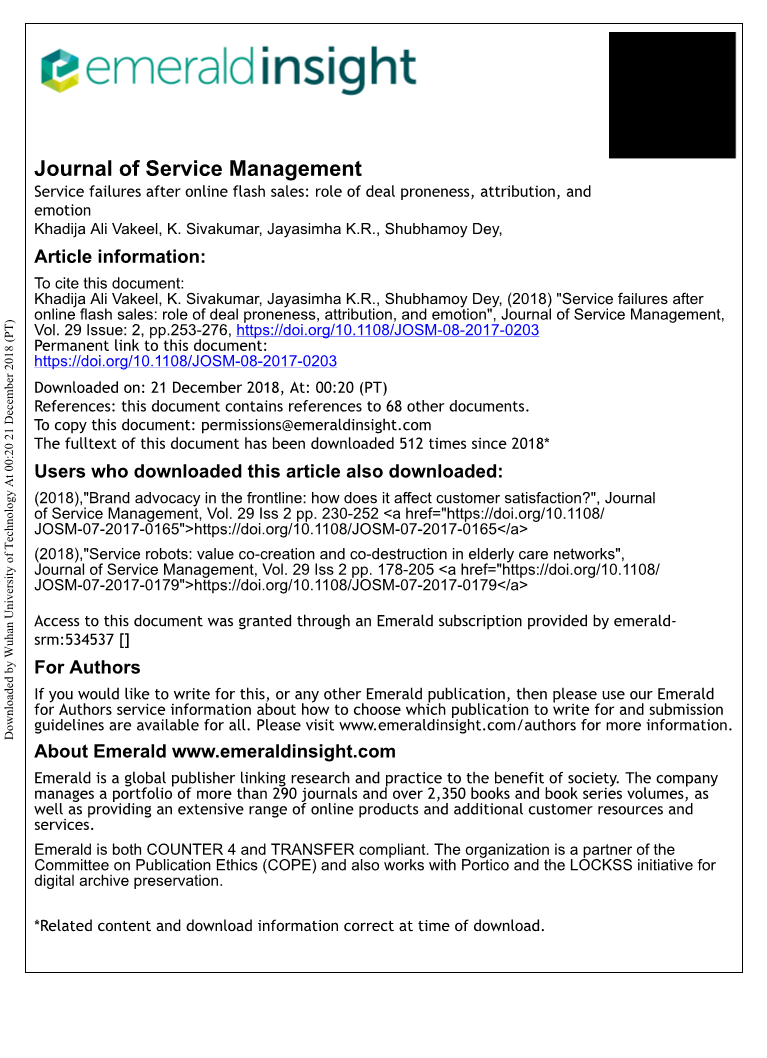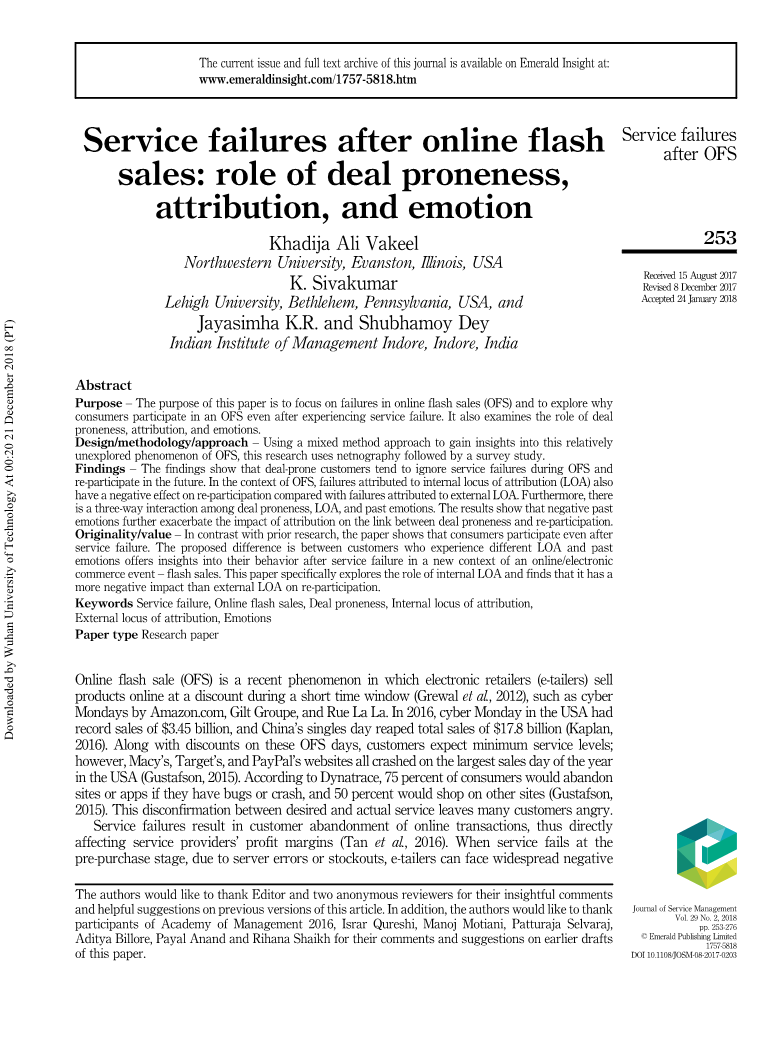

英语原文共 26 页,剩余内容已隐藏,支付完成后下载完整资料
在线Flash销售后的服务失败:交易倾向,归因和情感的作用
Khadija Ali Vakeel,K . Sivakumar,Jayasimha KR,Shubhamoy Dey
Journal of Service Management
Abstract(摘要)
Purpose – The purpose of this paper is to focus on failures in online flash sales (OFS) and to explore why consumers participate in an OFS even after experiencing service failure. It also examines the role of deal proneness, attribution, and emotions.
Design/methodology/approach – Using a mixed method approach to gain insights into this relatively unexplored phenomenon of OFS, this research uses netnography followed by a survey study.
Findings – The findings show that deal-prone customers tend to ignore service failures during OFS and re-participate in the future. In the context of OFS, failures attributed to internal locus of attribution (LOA) also have a negative effect on re-participation compared with failures attributed to external LOA. Furthermore, there is a three-way interaction among deal proneness, LOA, and past emotions. The results show that negative past emotions further exacerbate the impact of attribution on the link between deal proneness and re-participation.
Originality/value – In contrast with prior research, the paper shows that consumers participate even after service failure. The proposed difference is between customers who experience different LOA and past emotions offers insights into their behavior after service failure in a new context of an online/electronic commerce event – flash sales. This paper specifically explores the role of internal LOA and finds that it has a more negative impact than external LOA on re-participation.
目的-本文关注于在线限时闪销(OFS)的失败,并探讨消费者即使在遇到OFS服务失败后仍参与的原因,并研究了交易倾向,归因和情绪的作用。
研究设计/工具/方法- 使用混合工具方法来深入了解这种相对未开发的OFS现象,本研究使用网络志进行调查研究。
研究发现- 调查结果显示易交易的客户倾向于忽略OFS期间的服务故障并在未来重新参与。在OFS的背景下,与外部LOA导致的失败相比,内部归因轨迹(LOA)的失败也对重新参与产生负面影响。此外,交易倾向,LOA和过去的情绪之间存在三方面的相互作用。结果表明,过去的负面情绪进一步加剧了归因对交易倾向与重新参与之间联系的影响。
独特性/价值 -与之前的研究相比,本研究表明,即使服务失败消费者也会参与其中。提出的差异是:实验经历不同LOA和过去情绪的客户之间,在在线/电子商务事件 – 限时闪购的新环境中,对他们经历服务失败后的行为提供洞察。本文专门探讨了内部LOA的作用,发现它对外部LOA的再参与负面影响更大。
Keywords: Service failure, Online flash sales, Deal proneness, Internal locus of attribution, External locus of attribution, Emotions
关键词:服务失败,在线闪销,交易倾向,内部归因,外部归因,情绪
Online flash sale (OFS) is a recent phenomenon in which electronic retailers (e-tailers) sell products online at a discount during a short time window (Grewal et al., 2012), such as cyber Mondays by Amazon.com, Gilt Groupe, and Rue La La. In 2016, cyber Monday in the USA had record sales of $3.45 billion, and Chinarsquo;s singles day reaped total sales of $17.8 billion (Kaplan, 2016). Along with discounts on these OFS days, customers expect minimum service levels; however, Macyrsquo;s, Targetrsquo;s, and PayPalrsquo;s websites all crashed on the largest sales day of the year in the USA (Gustafson, 2015). According to Dynatrace, 75 percent of consumers would abandon sites or apps if they have bugs or crash, and 50 percent would shop on other sites (Gustafson, 2015). This disconfirmation between desired and actual service leaves many customers angry.
在线闪销(OFS)是一个近期现象,指电商在短时间内以折扣价在线销售产品(Grewal 等,2012),例如Amazon.com,Gilt Groupe的网络星期一,和Rue La La。在2016年,网络星期一在美国创下了34.5亿美元的销售记录,中国的“光棍节”收获了178亿美元总销售额(卡普兰,2016)。除了这些OFS日的折扣外,客户还希望获得最低服务水平; 除此之外在美国,Macy,Target和PayPal的所有网站一年中最大折扣日崩溃(Gustafson,2015)。据Dynatrace称,75%的消费者会放弃出错或崩溃的网站和应用程序,50%的消费者会在其他网站上购物(Gustafson,2015)。期望服务和实际服务之间的这种不确定性让许多客户感到愤怒。
Service failures result in customer abandonment of online transactions, thus directly affecting service providersrsquo; profit margins (Tan et al., 2016). When service fails at the pre-purchase stage, due to server errors or stockouts, e-tailers can face widespread negativeword-of-mouth (WOM). Service failures during OFS differ from regular failures in that service recovery cannot be salvaged because of high demand and limited time available (Smith et al.1999). Surprisingly, despite repeated failures, customers continue to participate in OFS.
服务失败导致客户放弃在线交易,从而直接影响服务提供商的利润率(Tan et al。,2016)。当服务在预购阶段失败时,由于服务器错误或缺货,电子零售商可能面临巨大的负面口碑(WOM)。OFS期间的服务故障与常规故障的不同之处在于,由于需求量大且时间有限,服务无法恢复(Smith 等,1999)。令人惊讶的是,尽管一再失败,客户仍然继续参与OFS。
This re-participation in OFS is due to the perceived monetary benefit that customers derive from their “deal proneness” (Lichtenstein et al., 1995). With an increase in events of service failures due to OFS, who the customer blames has also become an important issue for firms to understand repurchase (Albrecht et al., 2017). Locus of attribution (LOA) is customersrsquo; causal assignment of success or failure of an event to internal (e.g. self) or external (e.g. company, third-party services) factors (Weiner, 1985). Researchers have tended to pay more attention to stability and controllability dimensions of attribution theory than to LOA in service failure (e.g. Van Vaerenbergh et al., 2014). In response, Tan et al. (2016) have called for research in the area of online service failures and subsequent attributions by consumers, and the current research responds to their call. In addition, positive and negative emotions experienced during previous service encounters are affected by attributions and play an important role in OFS (Bagozzi et al., 1999; Tracy and Robins, 2004). In the context of OFS, the goals of this paper are to investigate the role of deal proneness, which induces customers to participate again in OFS despite past service failures, and to examine the contrasting roles of internal and external LOA and positive and negative past emotion.
重新参与OFS是由于客户从“交易倾向”中获得的货币利益(Lichtenstein 等,1995)。随着OFS导致的服务失败事件的增加,客户指责谁也成为公司了解回购的一个重要问题(Albrecht 等,2017)。归因轨迹(LOA)是顾客将事件成功或者失败归因于外部(公司、第三方服务)或者内部(自己)因素。相对于服务失败中的LOA,研究者更倾向于关注归因理论的稳定性和可控制性维度(如Van Vaerenbergh et al.2014)。作为回应,Tan等人(2016)号召对在线服务失败及其消费者归因领域进行研究,目前的研究响应了他们的号召。此外,在以往的服务接触中所经历的积极和消极情绪会受到归因的影响,
全文共63303字,剩余内容已隐藏,支付完成后下载完整资料
资料编号:[2297]
以上是毕业论文外文翻译,课题毕业论文、任务书、文献综述、开题报告、程序设计、图纸设计等资料可联系客服协助查找。


